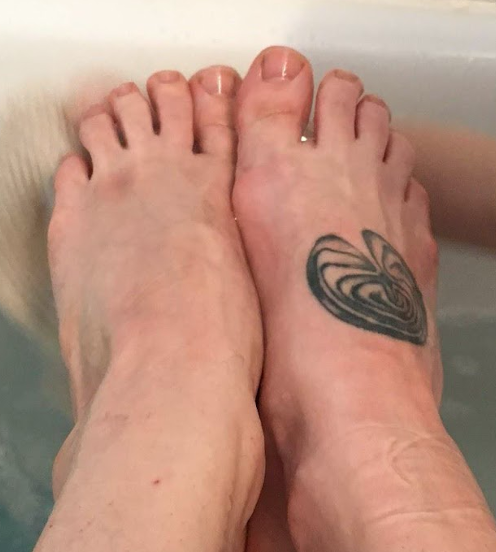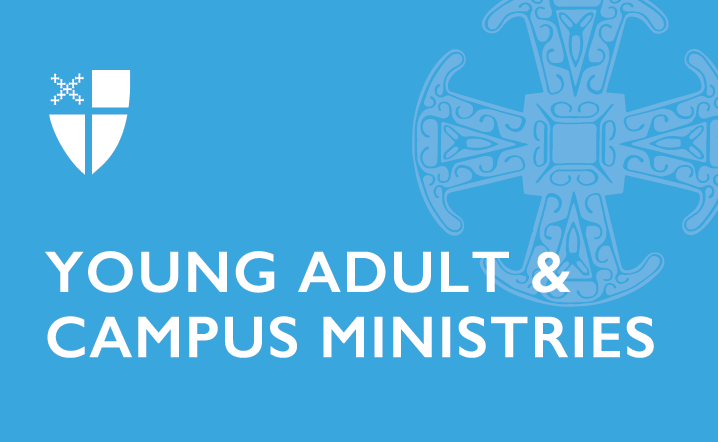Walking the Labyrinth Set Before Us
Reflections from Physical Distancing
By: The Rev. Kimberly Rowles Reinholz

I am a priest, a partner, a parent, and a person. I usually introduce myself that way when I write letters introducing myself. But right now, I feel like my vocation is both expanded to include kindergarten and preschool teacher, cafeteria worker, mental health worker, and completely paired down to beloved Child of God.
In the two weeks since we started quarantine/social distancing/ whatever we are calling flattening the curve – I have found myself listening to the experts, respecting the authority of my governor, and heading the guidance of my bishop. I serve in Richmond, Virginia, in a 3-point call as an associate parish priest who is responsible for our campus ministry at Virginia Commonwealth University, who is also responsible for our weekly ministry of healing hospitality and wholeness. On one level or another, everything I do has come to a screeching halt since March 13th. But on another, I am still doing all the things that God has called me to do- albeit in a new way.
I keep coming back to the labyrinth and pandemic. Being a huge fan of walking labyrinths, actually have one tattooed on my right foot, I have taken to heart the history of the Chartres Labyrinth in particular. The labyrinth built during the 13th century, provided was a way for Christians to go on Pilgrimage without endangering themselves during the crusades. (I am not saying that we should have ever been waging crusades over the Holy Land, to begin with- but I digress). I think that we are in a period much like the deans who designed the Chartres Labyrinth. We are trying to envision a way to develop our new ways of encountering the Divine with tools that are known and tools that are new.
We seem to be at the “throw the spaghetti at the wall and see what sticks” time of this crisis. It looks like everyone who can afford it has a YouTube channel, Facebook live stream, digital presence. While this is great for the most part, it also seems like we are saturating the market. Adapting to new realities is where my college students have been amazing. They know what they want, and they know what they need, and they ignore the rest.
These students went on spring break the week that coronavirus made landfall in the US. They celebrated the extension of that break but now are dealing with a whole new virtual world of education for which they didn’t sign up. They are navigating it surprisingly well. They are reaching out to resources, like their teachers, their counseling center on campus, and they are using their chaplains to help connect them one to another. Now I am not saying that there aren’t students I am worried about, who aren’t sleeping well, aren’t eating right, aren’t living in sketchy situations. But I am probably worried about the same students for the same reasons when there isn’t a pandemic if I’m honest.
Here is the part of the pandemic time, by which I am pleasantly surprised. Had you asked me what aspect of the community/communities I serve is the most essential two months ago, (which is I acknowledge a flawed question on many levels), I would have said our Sunday congregation.
They are the members of the vestry, they are the ones who pledge and give, and they are the ones who keep the lights on in the building. They are the parish. But the truth is that the ministry and mission of the Church that I serve depend upon the students. Especially the feeding ministry that happens every Friday – while it is led by a core group of amazing volunteers who are part of that Sunday crowd – had to reimagine its whole process when the college shut down its physical campus. The students are the ones who keep us going.
I already knew subconsciously because every summer and every break, we have a shortage of volunteers, but we can make it work with barebones skeleton crews for a few weeks at a time. But this pandemic has slapped me upside the head in the understanding that in reality, the Church depends on young people to run it.
They are doing it – they aren’t doing it the same way that previous generations have done it. They might not even call themselves Christian. But like I say every week when I welcome our volunteer crew – you don’t have to be a Christian to cut a carrot, but you help us live into our identity by showing up. You support us to seek and serve Christ in all persons loving our neighbor as ourselves and pursuing justice, freedom, and peace. The Church is not solely those who worship on Sundays. That is what I am reminded of this afternoon as we try to figure out how to run our meal program tomorrow.
They are doing it differently – they are on the zoom calls, they are in the hangouts, they are texting and calling and checking in as best they can. They are leading by example, and we all should be following them. Well, maybe not the ones who aren’t sleeping or eating well or setting healthy emotional boundaries. But we should walk this labyrinth set before us, and we will find that at the center of it all is Christ. God has been in this, providing us a path to follow and allowing us to go into the world being Christ to one another.
—–
The Rev. Kimberly Rowles Reinholz serves as the Associate for Service, Campus Ministry and Pastoral Care at Grace & Holy Trinity Episcopal Church, Richmond VA.

